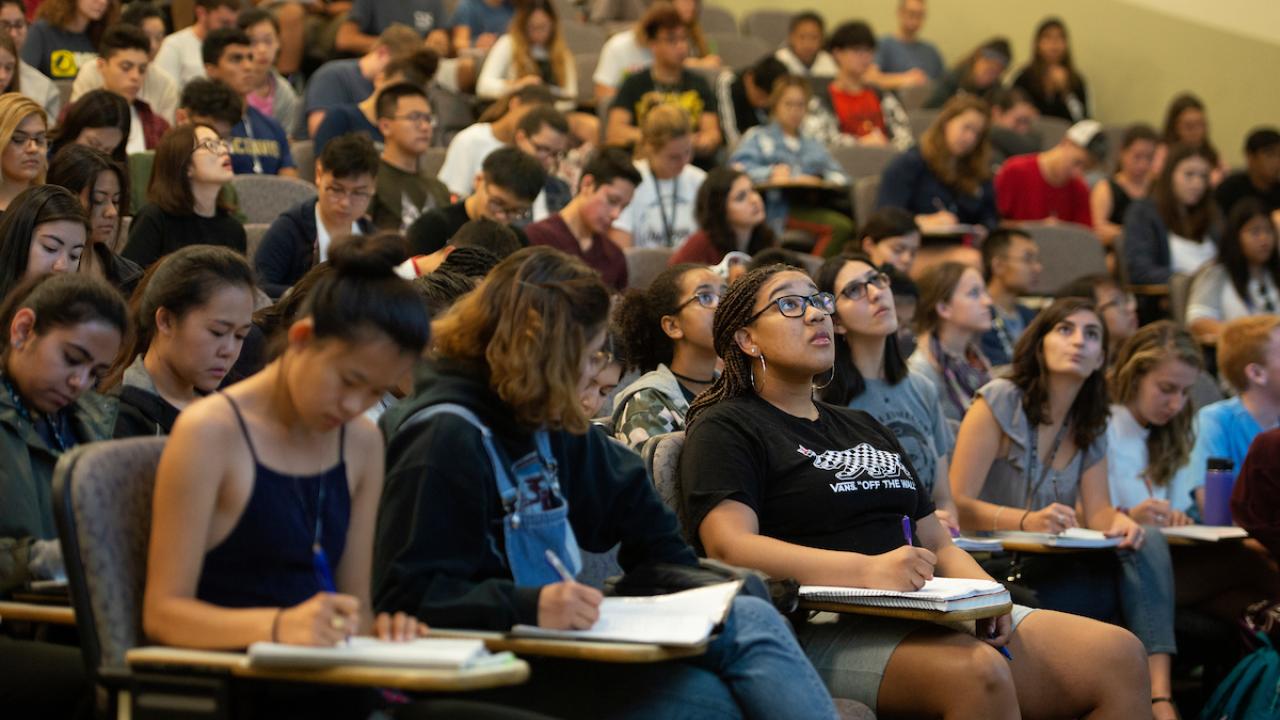
Dialogues Across Difference: Solutions to Disruptive Speech in the Learning Environment
A new Advancing Faculty Diversity grant
Quick Summary
- Addressing the challenges of disruptive speech in learning environments
- Following on the work of FRIENDS grant
- Three phases: Document; Share; Deliver and Sustain
The Office of the Vice Chancellor for Diversity, Equity and Inclusion has received its third UCOP Advancing Faculty Diversity (AFD) Improved Climate and Retention grant! The goal of the AFD Improved Climate and Retention program is to support campus efforts to improve the retention of under-represented faculty and to build inclusive and innovative academic units. This new AFD grant, “Dialogues Across Difference: Solutions to Disruptive Speech in the Learning Environment,” advances faculty retention by addressing the negative impact of disruptive speech in learning environments.
At a time when our civic spaces have become increasingly polarized, when we have become more isolated in our systems of belief, and when false news stories circulate more than factual ones, the grant examines how how existing notions of freedom of expression have served and not served our mission as a public university. UC Davis faculty are aware that learning spaces can be disrupted when faculty or other students use or experience speech as attacks on identities or lived experiences. For the purposes of this grant, disruptive speech is defined as politically provocative, harassing, or hate speech, including the display of symbols or objects. “Dialogues Across Difference” explores how this speech negatively affects our at-promise scholars and faculty from historically marginalized backgrounds in their roles as students and educators and offers a path to ameliorate the problem without infringing upon the free exchange of ideas that is foundational for university learning.
At U.C. Davis, our Principles of Community recognizes that the exercise of freedom of expression within a diverse environment calls for a nuanced balance between affirming the right to freedom of expression and striving to build and maintain a climate based on mutual respect and caring that rejects all forms of discrimination. To fulfill our teaching mission, we have a responsibility to create efficacious learning environments. To fulfill our research mission, we must support our faculty as they disseminate information. Both goals require us to consider proactive and courageous responses to disruptive speech that equip faculty to create and maintain learning environments that safeguard the dignity, rights, and well-being of students and faculty alike.
“Dialogues Across Difference” came about through the work of a Community of Practice in another AFD grant run through the DEI office, “FRIENDS–Faculty Retention and Inclusive Excellence Networks—Designing Solutions.” With FRIENDS, nearly four dozen associate professors from across campus and disciplines came together to discuss and propose solutions to some of the long-standing challenges facing mid-career faculty from advancing to full, making their service and scholarship count towards merit and promotion, and providing support to faculty that must manage divisive learning spaces.
Negative workplace climate and racial trauma both contribute to loss of productivity among faculty and to faculty turnover. The work of this grant will advance faculty retention by addressing these concerns. This project has three phases:
- DOCUMENT. The mechanisms in place to document disruptive speech in the classroom have been inadequate, discouraging, or intimidating so faculty have been reluctant to file official reports documenting their experience. Therefore, our first challenge is to gather and document a wide range of stories so that we have a clear, deep, and broad view of the nature of disruptive speech and problems that arise from it in the learning environment.
- SHARE. Once we have built a database of these experiences, we will build and convene communities of faculty, within and across academic units to create collective awareness of instances of disruptive speech in the learning environment in order to share experiences and solutions. These symposia will build on UC Davis’s success with Communities of Practice—networks of faculty gathering together with a common objective.
- DELIVER and SUSTAIN. In the final action, we will establish long-term support and guidelines. We will collaborate with Davis Repertory Theatre (DRT) to develop performance-based workshops to facilitate dialogue. Live and recorded performances adapted from the lived experience of UC Davis faculty are an important method for documenting incidents and experiences of disruptive speech in academic environments and offers a powerful alternative to the text or table-based presentation of data. We will develop workshops in which ethnographic performance is paired with forum theatre activities (drawing on the work of Theatre of the Oppressed founder Augusto Boal) in order to raise awareness, experience solidarity, and most importantly identify and propose revisions to harmful policies. We plan to record performances and provide facilitation toolkits that can be used either in synchronous or asynchronous options.
While our core audience for this project is ladder rank faculty, we believe that graduate students and other instructional staff will benefit as they spend considerable time in the classroom or lab working directly with undergraduates, and are the ladder rank faculty of the future, thus their inclusion is essential to ensuring long-term transformation.
The grant will be led by Principal Investigators Raquel Aldana, Professor of Law, and Lorena Oropeza, Associate Vice Chancellor for Academic Diversity and Professor of History. They will be advised by a talented and broad group of faculty and staff from across campus including:
- Diane Beckles, Professor and Associate Postharvest Biochemist, Plant Sciences
- Natalia Deeb-Sossa, Professor, Chicana/o Studies Department
- Margaret Laurena Kemp, Associate Professor, Theatre and Dance
- Jon Rossini, Associate Professor, Theater and Dance
- Brian Soucek, Professor of Law, Fellow with UC National Center for Free Speech and Civic Engagement
- Mikael Villalobos, Interim Associate Vice Chancellor, Office of Campus Community Relations
- Binnie Singh, Assistant Vice Provost, Academic Affairs
- Kem Saichaie, Director of Learning and Teaching, Center for Educational Effectiveness
- Marcela G. Cuellar, Associate Professor, School of Education
- Stephen Garcia, Professor, Graduate School of Management
- Adam Jacob, Associate Professor, Mathematics
